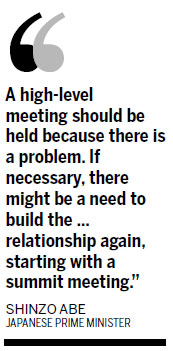China wary of Japan's revisions
Updated: 2013-01-30 07:26
By Zhao Shengnan (China Daily)
|
||||||||

Tokyo urged to 'respect' feelings of neighbors
Beijing urged Japan on Tuesday to take a "responsible" attitude toward history and "respect the feelings of Asian people" in response to Tokyo's plan to revise previous official statements about its wartime history, including a landmark 1995 apology for Japan's aggression during World War II.
Analysts said the plan is the latest attempt by Shinzo Abe's conservative administration to remove the shackles of the country's post-war pacifist system. But the move would raise hackles in Asian countries that suffered under Japan's military aggression and colonization, especially China and South Korea, which have territorial disputes with Japan.
Tomiichi Murayama, who made the 1995 apology when he was Japanese prime minister, is in Beijing to mend ties that were damaged by Tokyo's illegal purchase of part of China's Diaoyu Islands in September and by Abe's hawkish stance over the issue after taking power in December.
Abe suggested on Tuesday holding a summit with China, saying, "a high-level meeting should be held because there is a problem. If necessary, there might be a need to build the ... relationship again, starting with a summit". Chinese Foreign Ministry spokesman Hong Lei said correctly acknowledging and addressing the history of invasion and militarism is an important condition for Japan to win understanding from the international community, especially its Asian neighbors.
The 1995 apology by Murayama "is a solemn statement and promise that the Japanese government has made to Asian victims for its invasion and colonist history," Hong said at a daily news conference, urging Japan to "take history as a mirror and pursue a path of peaceful development".
Huo Jiangang, an expert on Japanese studies at the China Institutes of Contemporary International Relations, said Abe's moves sometimes have been contradictory as he wants to solidify right-wing policies but is also wary of further straining ties with Asian neighbors and then failing to showcase diplomatic accomplishments to woo voters.
"But Tokyo is somewhat incapable of balancing the two aspects at the same time. The right-wing forces often flare up tension but backfire on Tokyo," said Huo, citing Japanese Education Minister Hakubun Shimomura as one of the top supporters for Abe's hard-line positions.
Shimomura said that the Japanese government will review statements issued by past cabinets concerning sensitive historical perspectives with neighboring countries.
"This doesn't mean we will reject them and create something new, but it may be necessary to add forward-looking expressions," he said, adding that a 1993 statement by then-government spokesman Yohei Kono will be included.
The statement in which Japan admitted military involvement in forcing women into sexual slavery at wartime brothels has "caused misunderstandings", Shimomura said.
Meanwhile, Japan's education ministry will start discussions on whether it is necessary to revise textbook guidelines for schools from the elementary to senior levels, given that many lawmakers of the ruling party believe the current guidelines result in "masochistic" or "self-condemning" views of history in textbooks, Kyodo News Agency quoted sources as saying on Monday.
zhaoshengnan@chinadaily.com.cn
(China Daily 01/30/2013 page11)

 In Photos: 7.0-magnitude quake hits Sichuan
In Photos: 7.0-magnitude quake hits Sichuan
 Li Na on Time cover, makes influential 100 list
Li Na on Time cover, makes influential 100 list
 FBI releases photos of 2 Boston bombings suspects
FBI releases photos of 2 Boston bombings suspects
 World's wackiest hairstyles
World's wackiest hairstyles
 Sandstorms strike Northwest China
Sandstorms strike Northwest China
 Never-seen photos of Madonna on display
Never-seen photos of Madonna on display
 H7N9 outbreak linked to waterfowl migration
H7N9 outbreak linked to waterfowl migration
 Dozens feared dead in Texas plant blast
Dozens feared dead in Texas plant blast
Most Viewed
Editor's Picks

|

|

|

|

|

|
Today's Top News
Live report: 7.0-magnitude quake hits Sichuan, heavy casualties feared
Boston suspect cornered on boat
Cross-talk artist helps to spread the word
'Green' awareness levels drop in Beijing
Palace Museum spruces up
First couple on Time's list of most influential
H7N9 flu transmission studied
Trading channels 'need to broaden'
US Weekly

|

|







